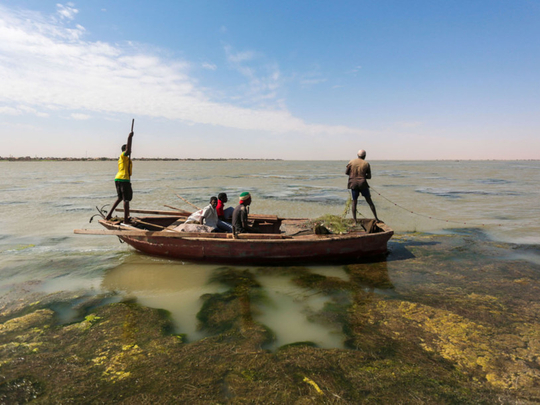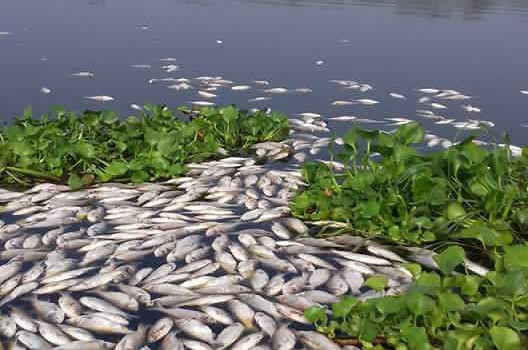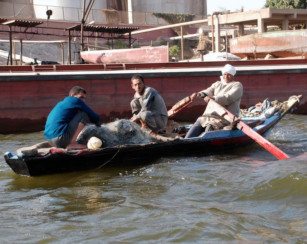
Cairo: Veteran fisherman Mustafa Badawi adjusts his white turban while he weighs his catch for the day.
“I only have 10 kilogrammes of fish and I spent the entire day fishing in the Nile,” he tells Gulf News.
His dissapointment is palpable.
Badawi took up fishing as a boy to helps support his family. The earnings, at the time, were enough to cover his family’s living expenses and he even had extra income to help put his brothers and sisters through school.
But today, the 51-year-old man is barely surviving.
Due to rising pollution, fish are increasingly dying out.
“Gone are the days of bounty,” Badawi, a father of three, adds wistfully.
In recent years, there have been repeated incidents of large quantities of fish perishing in Egypt, the Arab world’s most populous of nearly 95 million people.
The massive deaths were blamed on high levels of pollutants resulting mainly from the dumping of industrial waste, untreated sweage and carcasses into the Nile.
Like thousands of Egyptians whose livlihood depends on fishing, Badawi is worried about the future of his profession.
The parliament is expected soon to debate a draft law toughening penalties against polluting the Nile, which is Egypt’s main source of water.
The draft proposes a fine of 200,000 Egyptian pounds (about Dh41,600) and one year in jail for violators.
The government, meanwhile, says it has stepped up a crackdown on offenders.
Earlier this month, authorities launched a nationwide plan aimed at curbing Nile pollution. The plan features establishing six anti-pollution plants along the course of the river.
Despite the government’s steps to combat pollution, Badawi has discouraged his children from following his career path.
“I want my children to have stable jobs,” he says.
Some fisherman have given up on the profession altogether. They have turned their fishing boats into party boats—taking tourists or families out for rides where they are able to picnic.
Egyptians and foreign visitors are fond of enjoy Nile rides, locally known as feluccas, mainly in the evenings of the hot summer.
Egypt’s annual output of fish is estimated at around 1.64 million tons, down from the 1.94 million tons of the annual consumption, according to official figures.
The Nile makes up around 400,000 tons of this product amid a rising local demand for fish, which is generally lower in price than meat.
Egypt’s current fish output pales in view of the fact that Egypt boasts waterways stretching for around 1,600 kilometres.
The government says it aims to increase the fish production to reach 2.2 million tons a year in order to cope with population growth and the spike in demand.
However, pollution stands out as a major obstacle to utilisation of fishing resources in the country.
Several lakes across Egypt have also felt the brunt of pollution in recent years. One casualty is Lake Mariut off south the Mediterranean Sea city of Alexandria.
“The crisis of Mariut started around 20 years ago when factories around it began to dump their wastes into its waters,” says Abdu Al Kafrawy, a local fisher.
“The situation has worsened, lowering the catches from the lake and forcing many fishers to look for other professions,” he told private newspaper Al Masry Al Youm.
“We, the remaining fishers, sometimes raise money among ourselves to help clean up the lake in order to protect our livelihood. But, we cannot afford to do this on a continuous basis.”
Long-standing illegal encroachments have also diminished the area of Mariut from 60,000 acres to 16,000 acres, according to the paper.
“Over the last 10 years, businessmen and government companies have seized parts of the lake, filled them up and used for construction,” says Al Kafrawi. “In the past, the lake was more than two metres in deep. Now, its depth does not exceed one metres and a quarter as a result of accumulated sediments and disposed-of rubble,” he adds.
“The fisher throws his net inside the lake waters and when he hauls it up, he finds inside residues of sanitary and industrial wastes, and harmful weeds. The fisher’s day may end with his catch hardly more than two kilograms of fish.”














